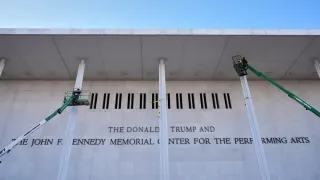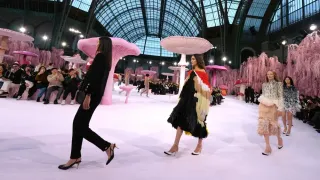March 11, 2017
Owners of LGBT Eatery Site Seek Landmark Status
Matthew S. Bajko READ TIME: 7 MIN.
The owners of a property in North Beach that once housed several LGBT restaurants, the first of which was known as the Paper Doll, are seeking city landmark status for the site.
Should their request for 524 Union Street be approved later this year, it would be the first landmark in the country to focus on an early queer restaurant, according to a local preservationist assisting with the application process. The Paper Doll is believed to be San Francisco's first restaurant and nightclub catering to the gay community.
The building would be the fourth property in the city to be designated a landmark for its LGBT historical significance and the first located outside of the gay Castro district. The last site to be added, in 2013, was the gay bar Twin Peaks (401 Castro Street), famous for being the first gay bar in the city to have clear glass windows at a time when people could be fired based on their sexual orientation.
The other LGBT city landmarks are the camera shop and residence of the late gay Supervisor Harvey Milk (573-575 Castro Street) and the original home of the Jose Theater and the Names Project, which oversees the AIDS Memorial Quilt (2362 Market Street).
"I would say no one knows about the Paper Doll," said Shayne E. Watson, a lesbian and architectural historian who is working with the family that owns the site on their city landmark request. "I think so much of the focus of LGBTQ history has been post-1965, so unless you are really looking for this earlier history, it is often easily overlooked."
In 1947 Mona Sargent, who was straight but operated several lesbian bars in town, bought into the Paper Doll restaurant three years after it opened. It quickly became a favorite hangout for lesbians and other queer patrons, and remained as such even though Sargent sold her ownership stake after only a year.
Writing in her memoir "Just Lucky I Guess: From Closet Lesbian to Radical Dyke," Elaine Mikels described the Paper Doll's clientele as "evenly divided between lesbians and gay men, all appearing middle class in their dress and manner."
In her book about San Francisco's LGBT community, "Wide Open Town," historian and SF State Professor Nan Alamilla Boyd noted that the Paper Doll served as a de facto community center where LGBT people "could make friends, find lovers, get information, or plan activities."
Charlotte Coleman, a lesbian activist and entrepreneur who worked at the Paper Doll, told Boyd it was "where we all met and grew up."
After the Paper Doll closed in 1961, the building continued to be a queer-friendly hangout with businesses such as Cadell Place (c. 1961-65), named for the short alley it sits on; the 524 Club (c. 1965-68), which was owned by founding Bay Area Reporter publisher Bob Ross; Noah's Ark (c. 1971-72); Manhattan Towers (c. 1972-75); and Cadell Place again (c. 1980-81).
Bev Smucha, who bought the building 40 years ago, told the B.A.R. that she was unaware of much of the property's ties to LGBT history until she happened to see it mentioned in the 2015 citywide LGBT context statement that Watson co-wrote with Donna Graves, a public historian based in Berkeley.
Smucha's son, Barak, who is a co-owner of the property, said, "We knew the history but not to that extent."
They were more familiar with the Paper Doll being featured in director Edward Dmytryk's 1952 noir film "The Sniper." In his 2005 book "San Francisco Noir," a compendium about the noir films that have featured the city, author Nathaniel Rich noted that the movie didn't make clear that "the Paper Doll was also what the authors of 'Where to Sin in San Francisco,' a 1948 guidebook, awkwardly called 'a rendezvous of the Gay People.'"
Over the last year Barak Smucha researched more of the property's history, looking up documents housed in various local archives that mentioned the building and its former occupants. Last summer the family first contacted the city's planning department about obtaining landmark status for the property.
Then, in January, the family submitted a draft historic context statement to the city in order to jumpstart the landmark approval process. In it, they described the Paper Doll as offering "a refuge where people of all walks of life and sexuality intermingled in a setting personifying ideals of an open, comfortable, Bohemian San Francisco; where for the span of a meal or a drink, the 'closet' did not exist for a predominantly lesbian and gay clientele."
"You can feel in the space how much history is here," said Barak Smucha as he showed off the now vacant restaurant space to a reporter and photographer. "This space is important to us and is important to the city."
Timothy Frye, a historic preservation officer for the city, wrote in an email he sent to the Smucha's in February that, "We're all excited about the proposed designation and apologize for the extra time it's taking to process."
In response to questions from the B.A.R., planning department spokeswoman Gina Simi replied in an email that the designation process can take up to nine months once there is a complete designation report.
"That's what we're currently working on with the owner and Shayne," explained Simi, adding that, "at this time, we do not have an anticipated hearing date yet as the application is still under review."
The city's Historic Preservation Commission must first approve the listing before it is sent to the Board of Supervisors. Watson, who is working pro bono on the report, said the process is time-consuming due to the rigorous requirements the applicants must meet in properly documenting a site's historic significance.
She applauded the Smucha family for taking the initiative to seek landmark status, noting they are the first owners of a property mentioned in the citywide LGBT context statement to do so.
"One of my favorite parts of this story is it is the first grassroots, owner-sponsored landmark to come after the context statement," said Watson. "Bev and Barak found all this history; it is great and it is wonderful."
The city's planning department has identified seven other LGBT historic sites it would like to see become city landmarks but has not indicated when it would move forward on writing the necessary reports. The list includes two in North Beach: 710 Montgomery Street, formerly home to gay bar the Black Cat, and 440 Broadway, once the site of lesbian bar Mona's 440 Club, which was owned by Sargent and her husband and believed to be the first lesbian bar in the U.S.
'Forbidden Establishment'
As for 524 Union Street, records indicate a saloon and restaurant existed at the site as far back as 1904, and the building was rebuilt after the 1906 earthquake and fire. At one time it had a bocce ball court inside, and much of the existing interior wood paneling was reclaimed from a former carriage house.
"The history is really deep and rich; it warrants it," said Barak Smucha of why the family is seeking the landmark status. "This was a special place for a lot of people and was very important to people."
Among the more interesting factoids the family included in their draft report was that the FBI had listed the Paper Doll in 1959 as "exclusively" patronized by "homosexuals and sex deviates," and that, through 1968, the Armed Forces Disciplinary Control Board had designated it as a "forbidden establishment."
The restaurant was divided into two spaces, with a circus-themed bar area in front and a dining room in the back. Upstairs at that time were apartments, with one occupant the late Rikki Streicher, a lesbian who worked as a bartender at the Paper Doll and would go on to open her own lesbian bars throughout town.
In 1954 the late Dante Benedetti, a straight man and North Beach denizen, bought the Paper Doll, and its clientele morphed into mainly gay men. State liquor authorities revoked his license in 1956 on the basis of the restaurant being a "homosexual hangout," as described in an old newspaper report.
After years of fighting against the accusations, Benedetti sold the business in 1961 to Don Farber, a professional baseball player who was required to rename the restaurant. He christened it Cadell Place.
Over the ensuing years the restaurant would change hands a number of times. According to the Smucha's research, Ross, who had worked as a chef at the Paper Doll, took ownership of it in 1965 and renamed it the 524 Club.
Their draft report includes a flier for the 1966 opening of Streicher's Maud's Study in Cole Valley that noted the buffet was "catered by Bob Ross of the 524 Club." A number of former employees of the Paper Doll would go on to open their own gay and lesbian bars in the city.
By the 1980s the restaurant space lost its gay affiliations and was home to a number of establishments that catered to mostly straight clientele. It has been vacant since 2012 when the French bistro Le Bordeaux closed.
The family would like to see a new restaurateur enliven the space once again, but the operator would first need to secure a conditional use permit from the planning commission. There is a small coffee kiosk operating from a space fronting Union Street.
The upstairs, where the notorious muckraking journalist Warren Hinkle, who died last August, had rented a small office space, is now completely leased to the digital marketing agency Ready State. On its website, the company has highlighted some of the building's LGBT past and is supportive of seeing it be designated a city landmark.
"We take every opportunity to tell our guests about the history," said Chief Marketing Officer Steven Wong. "I think it has a really positive effect on our creativity, being in marketing and based here."






